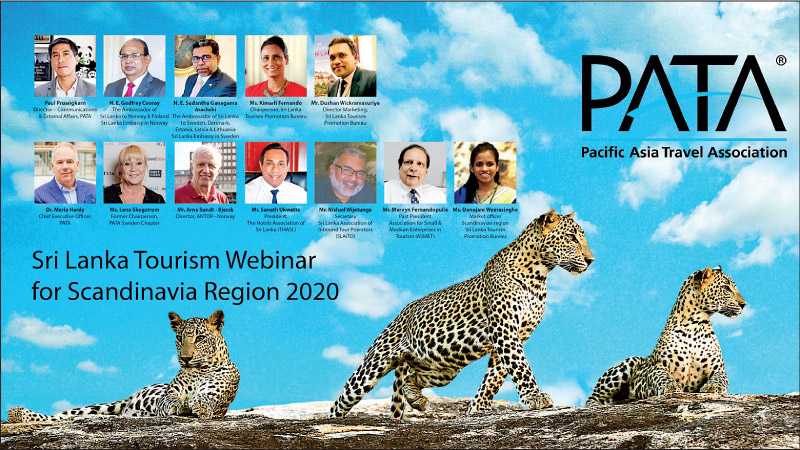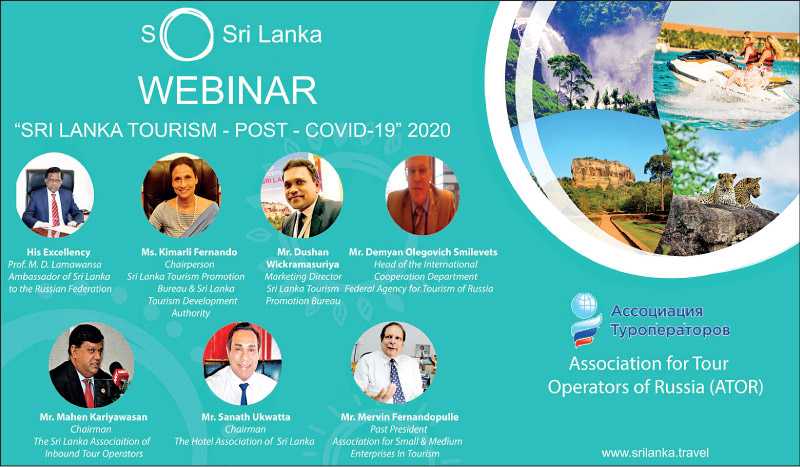Monday Feb 23, 2026
Monday Feb 23, 2026
Thursday, 22 October 2020 03:55 - - {{hitsCtrl.values.hits}}

Webinar for Scandinavia
The Sri Lanka Tourism Promotions Bureau (SLTPB) has conducted a series of webinars for key markets in collaboration with Sri Lankan high commissions overseas, main associations of Sri Lanka and the private sector, to keep key tourism stakeholders updated on the current situation in Sri Lanka, and to obtain feedback from global media and tour operators in order to develop post-COVID promotional activities for the respective markets.
This thrust in tourism is aimed at exploring Sri Lanka’s multifaceted treasure trove of resources, transforming the nation to optimum levels from the global fiscal crisis, and shoot growth aggressively benefiting the country at large.
SLTPB organised a wide-scale webinar on “Sri Lanka Tourism – post-COVID-19,” via the online platform of the Association of Tour Operators of Russia (ATOR), with the support of the Sri Lankan Embassy of Russia.
This webinar had 126 tour operators/travel agents registering from six countries – Russia, Ukraine, Belarus, Georgia, Uzbekistan and Iran – covering 23 cities.
The webinar began with opening remarks from the Ambassador of Sri Lanka to the Russian Federation Prof. M.D. Lamawansa. He briefly described the recent activities of the embassy aimed at promoting Sri Lanka as a tourist destination, and highlighted the importance of increasing the number of arrivals of Russian tourists who have “a special place in the heart of Sri Lankan tourism”. He also drew the attention of the attendees to the significance of enhancing cooperation in spheres such as culture and education.
Senior officials from tourism-oriented authorities of Sri Lanka made presentations. One of the key speakers, SLTPB Chairperson Kimarli Fernando, expressed the readiness of Sri Lanka’s tourism industry to welcome Russian guests. That said, there is no set date for the opening of the international airports. A briefing pertaining to the guidelines travellers need to follow on arrival in Sri Lanka, was made clear to the audience. The webinar participants were assured of the commitment of Sri Lankan tourism authorities to doing their very best in providing a safe and secure stay for tourist arrivals from Russia and other countries.
Building on reliable Russian tourism
SLTPB Director Marketing Dushan Wickramasuriya, in his update, mentioned positive dynamics on the Russian tourist arrivals, which experienced a 34% growth in 2019 despite the Easter Sunday attacks. He highlighted that before the pandemic the Aeroflot airlines had three direct flights per week from Moscow to Colombo, and expressed hope of the resumption of flights soon. The audience was informed of the strategic segments Sri Lanka intends to promote, particularly beach-oriented vacations, the honeymoon market and family holidays. He referred to the webinar as a great opportunity to start cooperating and establishing good communications between Sri Lankan and the Russian tourism sectors.
The representative of the Russian Federal Agency for Tourism Demyan Smilevets, devoted his presentation mainly to the impact of COVID-19 on the Russian economy and tourism sector, the approach adopted by Russia to handle the pandemic situation, and the criteria set for resumption of air connections with foreign countries. Smilevets also noted the longstanding friendly relations between Sri Lanka and Russia, and established the fact that Sri Lanka is the preferred travel destination for many Russian tourists.
SLAITO President Mahen Kariyawasan, THASL President Sanath Ukwatte, and ASMET past President Mervin Fernandopulle highlighted the importance of the market and steps taken by the private sector to cater to the current situation.
The program was concluded with a Q&A session, during which a wide range of questions were raised by Russian tour operators, who later described the webinar as a very interesting and informative event that was useful for tourism organisations amid uncertainties caused by the worldwide coronavirus pandemic. Most of the questions raised were concerning COVID-19 guidelines and health protocols.
Russia and CIS countries have shown year-on-year growth, with the highest tourist arrivals from Russia recorded in 2019 with 34% YOY increase in spite of the unfortunate Easter Sunday attacks in 2019.
Scandinavian interest in SL
Meanwhile on 17 September, an informative webinar was conducted for key tourism stakeholders of the Scandinavian region in collaboration with the Sri Lanka Embassy in Sweden and the Sri Lankan Embassy in Norway. The webinar was hosted by the Pacific Asia Travel Association (PATA) on their platform, with the participation of the PATA CEO Dr. Mario Hardy, raising a supportive hand for Sri Lanka. There were over 60 tour operators who participated in the webinar, all of whom were keen to obtain current updates on the post-COVID tourism plans of Sri Lanka.
The main purpose of the webinar was to highlight Sri Lanka’s achievements in controlling the pandemic as a nation, and steps taken to ensure the safety of tourists arriving in the country once the airport reopens. Also on the agenda was Sri Lanka’s recent endowment with the Safe Travel Stamp from the World Travel and Tourism Council (WTTC).
SLTPB reminded the participants on the unique characteristics of the destination and the tourism products offered by Sri Lanka as a preferred long-haul holiday destination for Scandinavian travellers. The opening remarks were made by the SLTPB Chairperson on the COVID situation and the effectiveness of Sri Lanka’s managing of the situation in comparison to the global state of affairs. This was followed by updates from the ambassadors of the respective missions and other panellists.
The webinar panel consisted of Ambassador of Sri Lanka in Sweden, Denmark, Estonia, Lativa and Lithuania Sudantha Ganegama Arachchi, Ambassador of Sri Lanka in Norway and Finland H.E Godfrey Cooray, PATA CEO Dr. Mario Hardy, PATA Sweden Chapter representative Lena Skogstrom, ANTOR (leading travel association in Norway) President Sundt Bjerck, Sri Lanka Tourism Chairperson Kimarli Fernando, Sri Lanka Tourism Director Marketing Dushan Wickramasuriya, Sri Lanka Tourism Market Officer for the Scandinavian region Danojani Weerasinghe, THASL President Sanath Ukwatte, SLAITO member Nishad Wijetunga and ASMET past President Mervyn Fernandopulle.
Scandinavia and the NORDIC region is an important region for Sri Lanka. The highest number of arrivals from this region was recorded in 2018. It is interesting to note that approximately 20% of the arrivals from Northern and Western Europe consists of Scandinavian travellers.
SLTPB eyes multiple Pakistan tourist segments
SLTPB has also connected with key tour operators in Pakistan with the support of the Sri Lanka High Commission there, where over 16 key tour operators from its main cities, including Islamabad, Karachi and Peshawar participated in the webinar. Promoting wedding tourism, introducing group packages for multiple segments such as luxury, honeymoon etc., promoting incentives for groups of pharmaceutical, banking and insurance, were highlighted as key areas for Sri Lanka to focus on going forward. Tour operators noted with great interest the trends in annual tours from many high-end schools and higher education institutions.
In June this year, SLTPB collaborated with Spice Land Holidays and One World, connecting with a large group of tour operators, having over 7,000 registrations.
Germany seen as key tourism market
SLTPB plans to organise a webinar for key tour operators with the support of the German Travel Association (DRV) in collaboration with the Sri Lankan Embassy in Berlin. As a top-level association, DRV represents the travel industry in Germany which includes tour operators and travel agents. Germany having recorded a 70 billion euro travel expenditure in 2019, SLTPB foresees the potential as a key tourism market in the post-COVID environment.
Going forward Sri Lanka tourism plans to host webinars in other European countries, as well as countries such as Australia, Japan, China, and those in the Middle Eastern region.
